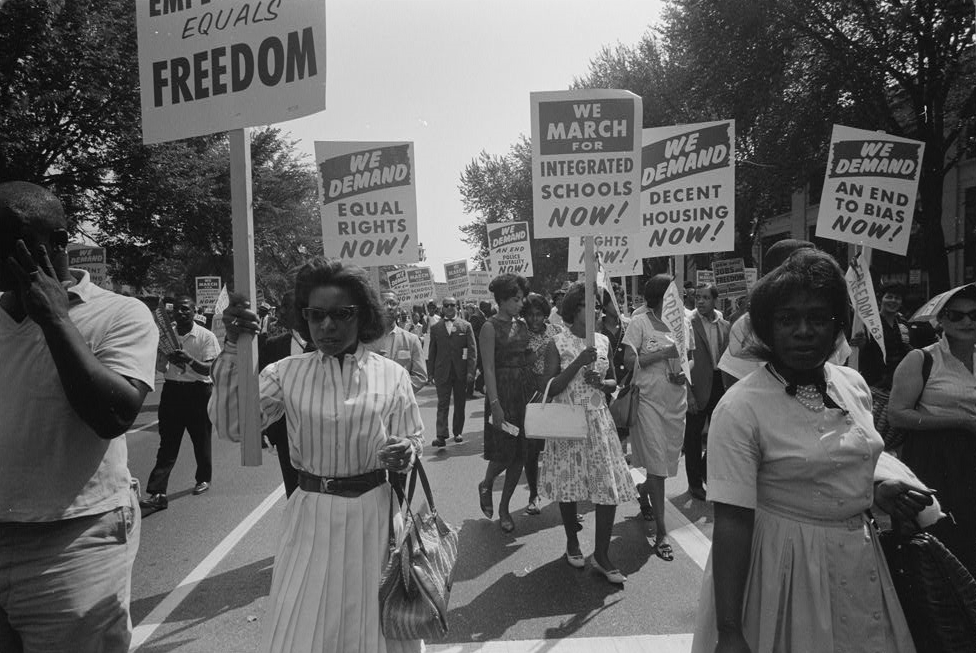From Small Beginnings: Rosa Parks and the Protest That Would Change America
Posted by Pete on Dec 1st 2019
64 years ago today, Rosa Parks transformed the Civil Rights Movement by refusing to give up her seat on a bus. There are parallels in the global protests of 2019.
Alabama, 1955.
Almost a century after Lincon's Emancipation Proclamation and the broken promise of Reconstruction, Jim Crow hung like a dark cloud over the American South.
Earlier that year, the black teenager Emmitt Till had been brutally murdered in Mississippi after being accused of flirting with a white woman. In the highly public trial which ensued, Till's killers had walked free.
In the weeks following the trial, the system of legal white supremacy and state-sponsored terrorism against African-Americans would have seemed as invincible as ever.
Until, very suddenly, it didn't.

A boycott in Montgomery that sparked a social movement
On December 1, 1955, Rosa Parks – a young textile worker and NAACP activist who'd been shaken up by the acquittal of Till's killers – had just boarded a bus in downtown Montgomery, Alabama, after working a long day shift.
Public transport in Montgomery was still segregated, as it was across much of the South, and Parks sat initially in a section in the middle of the bus marked for 'colored' people.
But before long, the bus had filled up to the point that some white passengers were without a seat.
The driver came to Parks and moved the 'colored' sign one row further back. Parks and four other passengers were ordered to move on the spot.
Parks, who would later recall thinking of Emmitt Till in that moment, simply answered:
“I don’t think I should have to stand up.”
The driver called the police and Parks was swiftly arrested for violating Montgomery’s racist public transport regulations.
But if the authorities thought that would be the end of it, they were very wrong.
Activists learned of Parks’ arrest and soon the whole Civil Rights Movement was converging on Montgomery.
Black leaders, among them a young Martin Luther King, organised a mass boycott of the Montgomery buses starting on 5th December – the day of Parks’ trial – in which 40,000 ordinary African-Americans took part.
Defiance was in the Alabama air and the organizers realised there was enough popular energy to extend the boycott.
It went on for another 380 days, ending only when the Supreme Court ordered Montgomery to desegregate its transport system.
Within a decade of Parks' simple act of resistance, the Civil Rights Act became the law of the land.
The struggle went on throughout the 60s and 70s – and continues today in the ongoing fights against institutional racism and police brutality – but the legal framework of the Jim Crow was officially history.
And it all began with one woman on one bus.

Click to see our new redesign in remembrance of Rosa Parks
A year of protests, from humble beginnings
The political world rarely moves in just one direction and 2019 is no exception.
On the one hand we’ve got reactionary clowns like Donald Trump and Boris Johnson fumbling with our democracies on both sides of the Atlantic.
But on the other, when we look out to the rest of the world, there are renewed waves of popular protest going on all around us.
Chile’s oligarchic, right-wing government has been forced to ditch the country’s Pinochet-era constitution by a massive protest movement.
Lebanon’s incompetent and nepotistic establishment is being rocked by popular demands for economic emancipation and accountable leadership.
The students of Hong Kong are rising up for their right to democratic self-government.
And the Fridays for Future movement has breathed new life into the global fight against climate destruction.

Lessons from the civil rights movement
No one knows how these and other contemporary protest movements will end. They are spread across the world, each one unique and with its own story.
But like the Montgomery bus boycott, many of them began in remarkably small and inconspicuous ways.
The Chilean protests started with a scattering of individuals jumping turnstiles after a subway price hike. The Lebanese movement was kicked off by a planned tax on WhatsApp!
Fridays for Future, meanwhile, began with a teenager's simple refusal to attend school while political leaders gamble away the welfare of future generations.
From small beginnings can come great change.
That is the real lesson of history.
Browse our full collection of tea towels and gifts inspired by Radical History
